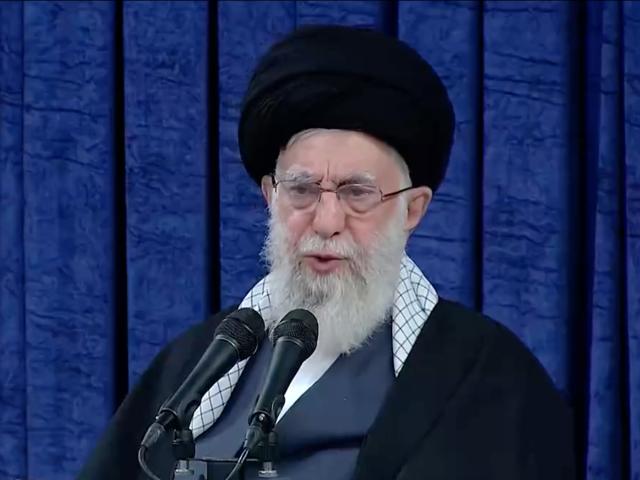In a recent address marking the conclusion of Ramadan, Iran's Supreme Leader Ayatollah Ali Khamenei strongly condemned Israel for its involvement in an April 1 airstrike on Damascus, which resulted in the death of Mohammad Zahedi, a commander of the Iranian Islamic Revolutionary Guard Corps (IRGC), among others. The targeted strike hit a building within an Iranian consulate complex, a site reportedly utilized by the IRGC. Following the incident, Iran has expressed a firm commitment to retaliate.
Tasnim News Agency relayed Ayatollah Khamenei's denouncement of the attack, underscoring his portrayal of Israel as a fundamentally flawed and malevolent state, which has further tarnished its record by assaulting the Iranian consulate in Syria. Khamenei's words painted a vivid picture of a regime that perpetuates injustice and harbors intentions to extend its punitive measures not only towards Israel but also towards any entities offering support to it.
Iran’s Supreme Leader Ayatollah Ali Khamenei reiterated on Wednesday a promise to retaliate against Israel over the killings of Iranian generals in Syria. https://t.co/qRiUR65XW1
— ABC News (@ABC) April 10, 2024
Amid these tensions, Alireza Tangsiri, commander of the IRGC's navy, issued a grave caution regarding the potential closure of the Strait of Hormuz, a critical conduit for a substantial portion of global oil exports. Speaking to al-Meyadeen, a pro-Hezbollah Lebanese media outlet, Tangsiri claimed Iran has the capability to shut down this vital waterway if it deems such a step necessary, hinting at a significant escalation in Iran's response to perceived threats from its adversaries, particularly Israel and the United States.
The assault on the consulate annex, viewed by Iran as sovereign territory, was highlighted as a direct affront to the nation, with Khamenei asserting that this act of aggression would not go unpunished. This incident was contextualized within a broader narrative of martyrdom and resistance, with the Supreme Leader calling upon the Iranian populace to reflect on the sacrifices made, especially during the sacred period of Ramadan.
Interesting part of Ayatollah Khamenei’s speech for Eid Fitr today:
— Arya - آریا 🇮🇷 (@AryJeay) April 10, 2024
When Iran’s leader, Sayyid Khamenei, was saying that israel will be punished, the commander of IRGC Aerospace Force, Hajizadeh, was giving a very interesting smile. pic.twitter.com/Z4vBbjoOYJ
Khamenei's discourse extended beyond the immediate geopolitical frictions, touching on the spiritual and societal realms. He emphasized the importance of religious observance, particularly among the youth, while also acknowledging the diversity of religious expression within Iran. His remarks subtly addressed the complex dynamics of faith and governance, suggesting a stance of encouragement rather than coercion in matters of religious practice.
If Iran attacks from its territory, Israel will respond and attack in Iran@khamenei_ir https://t.co/KQw5c4QlXU
— Israel Foreign Ministry (@IsraelMFA) April 10, 2024
Furthermore, the Ayatollah's comments on the situation in Gaza were poignant, as he accused Israel of perpetrating violence against "defenseless people." This critique was part of a larger critique of Western nations' responses to the conflict, which, according to Khamenei, amounted to mere lip service rather than substantive action to halt the hostilities. Iran's leadership seeks to cast itself as a staunch defender of the oppressed, particularly in the context of the Gaza conflict, leveraging such narratives to bolster its regional influence and ideological standing.


